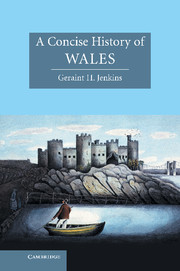Book contents
- Frontmatter
- Contents
- List of illustrations
- Preface
- 1 The earliest inhabitants
- 2 The Heroic Age, 383–1063
- 3 The Anglo-Norman conquerors, c. 1063–1282
- 4 Pestilence, rebellion and renewal, c. 1283–1536
- 5 Early modern Wales, 1536–1776
- 6 A crucible of the modern world, 1776–1900
- 7 Wales awakening? 1901–2006
- 8 Whither Wales?
- Sources of quotations
- Guide to further reading
- Index
- CAMBRIDGE CONCISE HISTORIES
4 - Pestilence, rebellion and renewal, c. 1283–1536
Published online by Cambridge University Press: 05 June 2014
- Frontmatter
- Contents
- List of illustrations
- Preface
- 1 The earliest inhabitants
- 2 The Heroic Age, 383–1063
- 3 The Anglo-Norman conquerors, c. 1063–1282
- 4 Pestilence, rebellion and renewal, c. 1283–1536
- 5 Early modern Wales, 1536–1776
- 6 A crucible of the modern world, 1776–1900
- 7 Wales awakening? 1901–2006
- 8 Whither Wales?
- Sources of quotations
- Guide to further reading
- Index
- CAMBRIDGE CONCISE HISTORIES
Summary
Hwch Ddu (Black Sow) and Chwilen Bwm (Beatle the Cockchafer) are two rough-hewn fictional characters in one of the most exuberant and successful Welsh-language novels of recent times. Written in the genre favoured by Boccaccio (who also makes a cameo appearance in the tale), Pestilence (Y Pla) (1991) recounts the odyssey of Salah Ibn al Khatib, a young Islamic student, who was dispatched from Cairo to assassinate the King of France at a time when the calamitous pandemic known as the Black Death was remorselessly pruning the population of Europe. During this picaresque adventure the student found himself in the upland demesne estate of Dolbenmaen in Eifionydd, at a time when the pestilence was threatening to destroy the socio-economic fabric of this small medieval community in north-west Wales. On his arrival, he was immediately dubbed the ‘Dark One’, a satanic figure whose presence boded nothing but ill for the traumatized peasants. The serf girl, Hwch Ddu, gloomily predicted that ‘we'll be no more than flies on a bullock's arse, to be whipped by the devil's tail’, a reminder not only of the transience of human life but also of the sheer impotence of men and women in the face of such a deadly, killing disease. Unfit for the squeamish, this harrowing tale offers a far more convincing insight into the plague-ridden world of fourteenth-century Wales than any conventional historical account based on official documents can provide.
- Type
- Chapter
- Information
- A Concise History of Wales , pp. 96 - 130Publisher: Cambridge University PressPrint publication year: 2007



